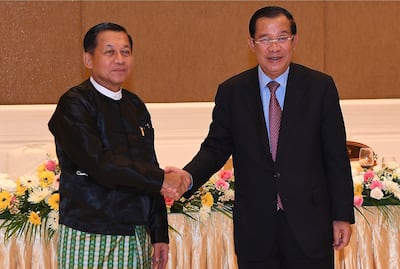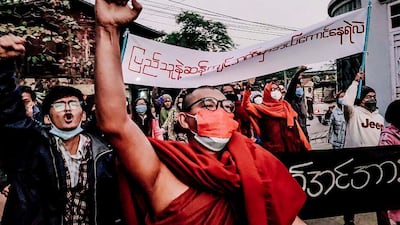The first anniversary of the military coup in Myanmar has not just focussed attention on the dire state of the country and its suffering under the regime's crackdowns. It has also exposed fissures in Asean, the nearly 700 million-strong Association of South-East Asian Nations to which Myanmar belongs.
Arguably the most successful regional grouping in the world – none of the 10 members would dream of trying to leave, as the UK did the EU – Asean makes much of its centrality to the Asia-Pacific’s economic, political and security architecture. And the World Economic Forum recently stated that as a whole, the association was on track to be the globe’s fourth-largest economy by 2030.
Letting Myanmar join the group in 1997 was controversial, however, as it was virtually a pariah state and had been a military dictatorship since 1962. The path towards democracy that the country took from 2010 onwards was often cited as a post-hoc justification for its admission. So the reversal of that process after the democratically elected government led by Aung San Suu Kyi was overthrown by the military, headed by Min Aung Hlaing, last February, has left Asean looking impotent when it comes to one of its members taking actions that almost the whole world has condemned.
Last year, when Brunei held the rotating chair, Asean did take what was for the concord-driven group pretty strong action. In April, it agreed a “Five-Point Consensus” that called for constructive dialogue and an immediate cessation of violence. After it became obvious that no progress had been made at all, Min Aung Hlaing was excluded from a leaders’ summit in October and also from a China-Asean summit the following month.
This year started with Asean’s new chair, Cambodia, appearing to take the opposite approach and a far more emollient line. Prime Minister Hun Sen visited Myanmar in January and held talks with Min Aung Hlaing, whose foreign minister Wunna Maung Lwin was then invited to an Asean foreign ministers’ meeting to be held in the middle of the month. The gathering was rescheduled after various participants pled Omicron-related excuses for why they couldn’t attend, but the real reason was opposition to a representative of the junta being there at all. Indonesia, Malaysia and Singapore were known to be vehement on this point.
Until recently, it looked as though the impasse was going to be repeated when the ministerial gathering finally convenes on February 16 and 17, as the invitation to Wunna Maung Lwin had not been rescinded. A repeat of 2012 – when Cambodia was last Asean’s chair and for the first time in its then 45-year history a foreign ministers’ meeting concluded without a joint communique being issued – was the “nightmare haunting” his country’s chairmanship, said Pou Sothirak, a former minister and ambassador, in a webinar hosted by The Diplomat magazine.
“Asean’s credibility and unity are at stake,” warned Mr Sothirak, who has been executive director of the Cambodian Institute for Co-operation and Peace since 2013. After the atrocities committed under the junta, it seemed hard to see why any process of reconciliation should begin with Asean making the military the lead interlocutor. Was the association going to be irredeemably split by the issue of Myanmar during Cambodia’s chairmanship? Did Hun Sen, whose iron grip on power has rarely wavered since he first became his country’s prime minister in 1985, have an affinity for autocrats?

It may, however, be much more complicated than that. Aaron Connelly, who leads research on South-East Asia at the International Institute for Strategic Studies in Singapore, pointed out that Hun Sen had played a very active role in Asean’s meeting on Myanmar last April, and was said to have been highly critical of Min Aung Hlaing. Hun Sen “didn’t appear to be on a good footing” with the junta, Mr Connelly said. Many have, instead, raised the Cambodian leader’s image of himself as a peacemaker, drawing on his experiences helping to bring an end to the country’s decades-long civil war in the 1990s.
Mr Connelly also suggested that the invitation to Myanmar’s foreign minister may have been a misstep or misunderstanding, since it had not been explicitly spelt out that excluding the junta leader last year meant that no regime ministers should ever attend Asean gatherings.
In any event, Cambodia has said that a non-political representative from Myanmar has been invited to the mid-February meeting, not the military-appointed foreign minister. A disaster for Asean – and it cannot be overstated just how significant the non-issue of a joint communique was in 2012 – seems to have been averted.
But that does not mean Hun Sen’s conviction that he is in a unique position to bring all sides together in Myanmar has disappeared. After all, Mr Sothirak said, last year’s Five-Point Consensus had “no roadmap, no timeframe”. Perhaps there could be something to Hun Sen’s approach, which he characterised as “no conditions, we just want to talk to you”.
“If he doesn’t break the ice, what’s next?” asked Mr Sothirak. “Maybe we should give Hun Sen the benefit of the doubt.”
The third speaker at the webinar, Elina Noor, director of political-security affairs at the Asia Society Policy Institute in Washington, appeared to concur, with reservations. Given the humanitarian catastrophe in Myanmar, she said, “there needs to be a timeframe to assess if this approach is working".
No one could disagree. The world has looked on with horror as civilians have been massacred and villages have been burned to the ground. But Myanmar’s military has a long history of ignoring the repugnance of the international community and surviving whatever sanctions it is placed under. Perhaps Hun Sen, who is rarely given credit for anything apart from his ability to remain in office, can succeed where no one else has so far. Asean, and the people of Myanmar, must fervently hope that his belief in his peace-making faculties translates into real progress on the Five-Point Consensus. An easing of the country’s misery cannot come soon enough.


